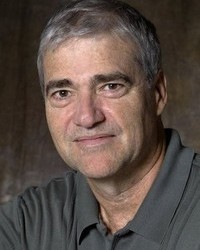
Peter Ward
Professor
Professor, UW Dept of Biology
Adjunct Professor, UW Dept of Astronomy
Participating Faculty, UW Astrobiology Program
Office: KIN-162
Phone: 206-543-2962, 685-3825
Fax: 206-543-0489 (shared)
Email: argo@uw.edu
Interests: Paleontology, Astrobiology, mass extinctions and habitability, conservation biology of coral reefs
Research Groups: Isotope Geochemistry, Astrobiology, Paleontology
Peter Ward is currently examining the nature of the Cretaceous-Tertiary extinction event with studies in France and Spain involving detailed field work which concentrates on ammonites and bivalves. Ward is also researching speciation patterns and ecology of the living cephalopods Nautilus and Sepia. A final field of research is examining the stratigraphic history of West Coast Cretaceous basins through detailed biostratigraphy and basin analysis.
Recent Publications:
1. Beneath Puget Sound (1974, PB Press, Seattle); 2. The Natural History of Nautilus (1987, Unwin Hyman, London); 3. In Search of Nautilus (1988; Simon and Schuster); 4. On Methuselah's Trail: living fossils and the great extinctions (1991, W.H. Freeman), which won the Golden Trilobite Award by the Paleontological Society for best science book of 1991, and was nominated for a Los Angeles Times Book Award as well as being a Book of the Month Club selection, 5. The End of Evolution: on mass extinctions and the preservation of biodiversity (1994, Bantam Books) was one of three finalists for the Los Angeles Times Book Award (science category) ; 6. The Call of Distant Mammoths: What killed the Ice Age mammals (1997, Copernicus: Springer Verlag) 7. Time Machines: scientific explorations in deep time (1998, Copernicus: Springer Verlag) 8. Rare Earth: why complex life is uncommon in the Universe(with Don Brownlee) (2000, Copernicus: Springer Verlag), named by Discover Magazine as one of the ten most important science books of 2001. 9. Rivers in Time (2000, Columbia University Press) 10. Future Evolution (with Alexis Rockman ) 2001, W.H. Freeman 11. The Life and Death of Planet Earth) 2003 Henry Holt12. Gorgon: paleontology, obsession, and the greatest catastrophe in Earth History,2004 Viking Penguin. Gorgon was awarded a Washington State Governor’s Book Award in 2005, and was nominated for a Keck Science Writing award. 13. Life as We Do Not Know It: the NASA search for and synthesis of alien life” was published by Viking in November, 2005, and it was named one of Library Journals “Best Books of 2005: (http://www.libraryjournal.com/article/CA6298434.html ). It was also nominated for a Keck Science Writing Award. 14. Out of Thin Air: Dinosaurs, Birds, and Earth’s Ancient Atmosphere, (2006) The Joseph Henry Press, of the National Academy of Sciences, was a main selection of the Discover Book Club. 15. Under a Green Sky: global warming, the mass extinctions, of the past and what they can tell us about our future mass extinctions, (2007), Smithsonian Books (Collins) 16. The Medea Hypothesis, 2009, Princeton University Press, was listed by the New York Times as one of the “100 most important ideas of 2009”.17. Our Flooded Earth, 2010. Harper Collins18. In Press: A New History of Life: from Formation to Information(with Joseph Kirschvink). Harper Collins